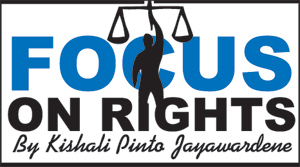Eminently understandable reaction by government
This is perhaps one of the most powerful statements made by a visiting United Nations official in recent times. The Government’s immediate knee-jerk response that the High Commissioner has exceeded her mandate was unsurprising. Astute observers would recall that this is precisely the same reaction by some government propagandists when the Lessons Learnt and Reconciliation Commission issued its report dwelling on the alarming deterioration of the Rule of Law in the country. There too, the LLRC was accused of exceeding its mandate despite the basic fact that nothing could have been more fundamental to its inquiry.
Indeed, the language used by Government Ministers in reference to the High Commissioner’s statement is regrettable but in the same breath, eminently understandable. Subjecting the authoritarian nature of this regime to meticulous scrutiny against the overarching standard of the Rule of Law is precisely what this Government fears the most.
On the other hand, it may also be safely said that wading into the murky waters of possible war crimes during the close of conflict in 2009, replete as this is with videos of killings that immediately provoke hotly combative debates, is exactly what this Government loves the most. Its resulting fervor as it wraps the patriotic mantle of national sovereignty around itself, invoking the murderous character of the Tamil Tigers to its benefit is predictable, as breathtakingly hypocritical as this may be.
Not even the farce of a democracy
This is not to say that killings in conflict should not be brought to a measure of accountability as this column has persistently stated. As much as Tamil civilians were caught in the absurdly named No-Fire Zones during 2009, thousands of Sinhalese were killed by a Sinhalese government with similar brutality during the eighties. Muslims too have suffered enormous travails. The demand for accountability during extraordinary times of conflict is therefore a decades-long cry. We deserve to have this demand satisfied.
However the ‘national question’ faced currently by us is the nascent emergence of a dictatorship which does not even bother to clothe itself in the deceptive garments of a democracy. President Mahinda Rajapaksa’s assertion that Sri Lanka cannot be a dictatorship as it holds regular elections only indicates the unbearably flippant nature of that debate from the Government’s point of view.
Dispensing with this dangerously erroneous perception is a collective struggle faced by the majority and minorities alike which needs to be prioritised. Hence, the High Commissioner’s straightforward and no-nonsense assessment of what she perceived to be the ‘curtailment or denial of personal freedoms and human rights…(as) linked to persistent impunity and the failure of rule of law’ is a seminal marker. And insofar as the direction towards which future international scrutiny will be directed is concerned, the warnings for this Government cannot be clearer.
The hammer of corrosive politicization
Certainly the defining of this national struggle is compulsorily linked to the integrity of our national institutions, recalling standards that once, even with conflict, Sri Lankans upheld with grace and dignity.
Last Saturday, President Mahinda Rajapaksa was reported to have observed, during an interview with The Australian, that ‘If you tell anybody, even my ambassador, that you’ll give him citizenship, and for his sons too, he’ll be there in an instant” (see Sunday Times, online edition, 31st August 2013). This remark was apparently made in the context of the excellent educational standards maintained by Australian institutions. Regardless, these statements sit oddly with the public persona of a President who touts national pride along with his customary satakaya as characteristic hallmarks.
At one point of time not so long ago, those of us proud to have studied in Sri Lankan educational institutions had a distinct sense of claiming our citizenship in a particular way. Now, a vastly different rationale is in play. The President’s remarks, even in jest, would undoubtedly strike a highly discordant note to academics slaving away at Sri Lankan universities and withstanding the hammer of political pressure wielded by his own regime.
What is national pride?
Reportedly, the UN Commissioner opened her remarks during her closing press conference by saying that ‘I am a South African and proud of it.’ South Africa itself was at one time, one of the most despised nations in the world. Yet, it was able to restore its national dignity not only because of the undeniably precious gift of a Nelson Mandela but also because ordinary South Africans realized the importance of reconciliation, nation building and true national pride.
In contrast and given the corrosive politicization of our systems, are we able to say anymore that we are proud to be a Sri Lankan lawyer, doctor, journalist or judge? Perhaps this is a question that each of us must direct towards our own consciences.
– Sunday Times
